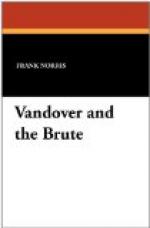But Vandover interrupted him with a gesture, saying, “Don’t go on, Dolly; it isn’t the least use. There was a time for that, but that was long ago. I used to care, I used to be sorry and all that, but I’m not now. Ruining myself? Why, I have ruined myself long ago. We’re both ruined—only in your case it wasn’t your fault. It’s too late for me now, and I’m even not sorry that it is too late. Dolly, I don’t want to pull up. You can’t imagine a man fallen as low as that, can you? I couldn’t imagine it myself a few years ago. I’m going right straight to the devil now, and you might as well stand aside and give me a free course, for I’m bound to get there sooner or later. I suppose you would think that a man who could see this as plainly as I do would be afraid, would have remorse and all that sort of thing. Well, I did at first. I’ll never forget the night when I first saw it; came near shooting myself, but I got over it, and now I’m used to the idea. Dolly, I can get used to almost anything. Nothing makes much difference to me nowadays—only I like to play cards. Look here!” he went on, laying out the notice from the bank upon the table, “this came to-day. You see what it is! I sold the old house on California Street. Well, I’ve gambled away that money in less than a year. It seems that I’m a financial ruin now, but”—and he began to laugh—“I live through it somehow. The news didn’t prevent me from getting drunk to-night.”
After young Haight was gone, Vandover went to bed, turning out the gas and drawing down the window half-way from the top. The wine had made him sleepy; he was dropping away into a very grateful doze when a sudden shock, a violent leap of every nerve in his body, brought him up to a sitting posture, gasping for breath, his heart fluttering, his hands beating at the empty air. He settled down again, turning upon his pillow, closing his eyes, very weary, longing for a good night’s sleep. Dolly Haight’s terrible story, his unjustified fate, and the hopeless tragedy of it, came back to him. Vandover would gladly have changed places with him. Young Haight had the affection and respect of even those that knew. He, Vandover, had thrown away his friends’ love and their esteem with the rest of the things he had once valued. His thoughts, released from all control of his will, began to come and go through his head with incredible rapidity, confused ideas, half-remembered scenes, incidents of the past few days, bits and ends of conversation recalled for no especial reason, all galloping across his brain like a long herd of terrified horses; an excitement grew upon him, a strange thrill of exhilaration. He was broad awake now, but suddenly his left leg, his left arm and wrist, all his left side jerked with the suddenness of a sprung trap; so violent was the shock that the entire bed shook and creaked with it. Then the inevitable reaction followed, the slow crisping and




